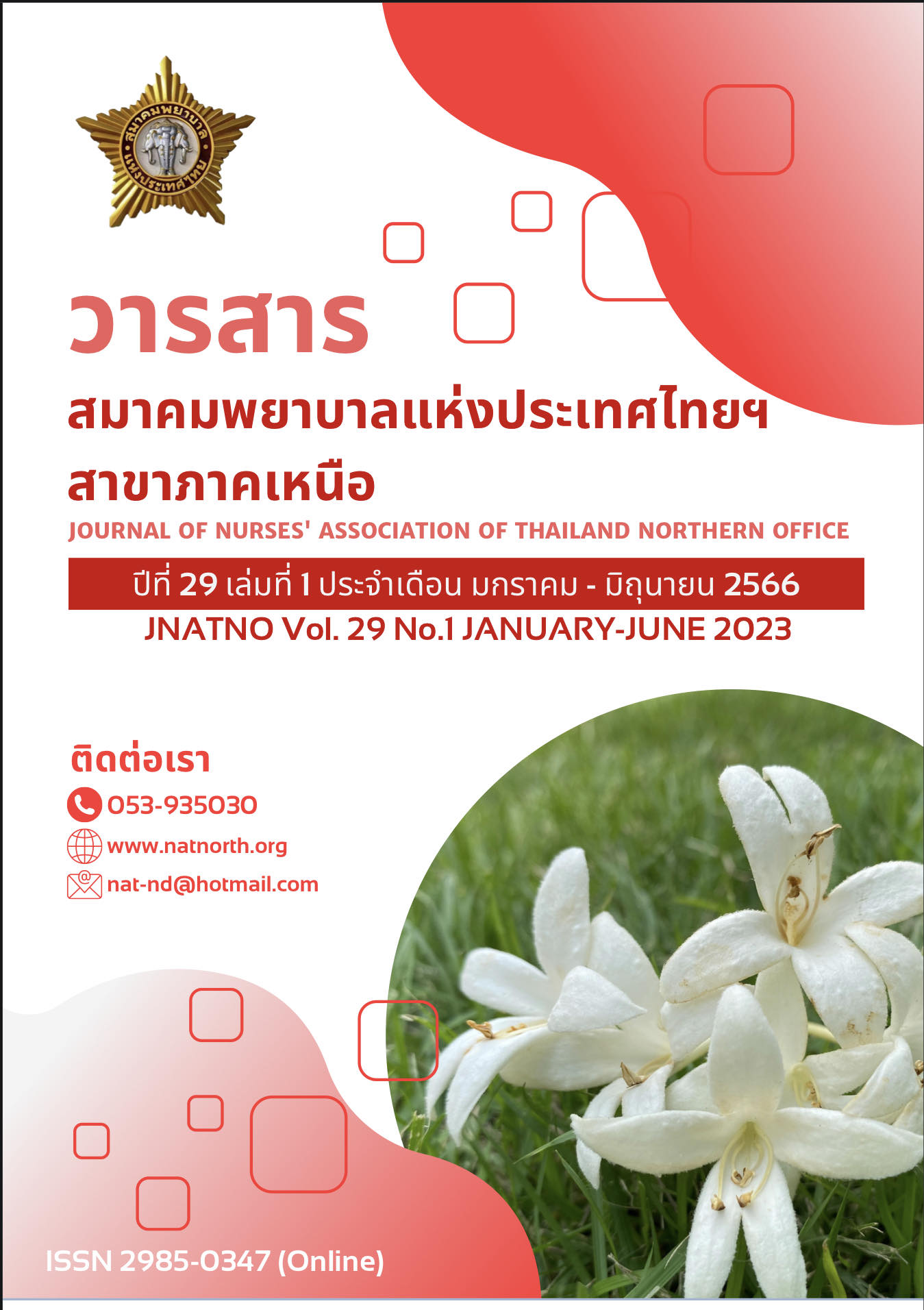The Application of Positive Self-talk Technique in Nursing Clinical Practice: A Case Study of an Adolescent Thalassemic Patient with Depression
Keywords:
Positive self-talk technique, Adolescent patient thalassemia, DepressionAbstract
Adolescents with thalassemia encounter both physical and mental effects because they are in the period of development of physical, mental, and self-identity. Having inappropriate experiences and coping strategies may lead to depression and that requires proper assistance to face the situations. Psychotherapy and promoting problem-solving among adolescents with Thalassemia who have mild to moderate depression are essential for them to cope and face their illness suitably. This article aims to describe the application of positive self-talk technique in adolescent thalassemic patients with depression. It is one of the techniques to promote patients in developing effective coping and adaptation skills.
References
พชรพรรณ สาริสูต. การศึกษาคุณภาพชีวิตของผู้ป่วยเด็กโรคธาลัสซีเมียที่มารับเลือด ในหอผู้ป่วยกุมารเวชกรรม โรงพยาบาลลำพูน. วารสารพยาบาลศาสตร์มหาวิทยาลัยสยาม 2562;43:21-33.
จิราภรณ์ อรุณากูร. ภาวะซึมเศร้าในวัยรุ่น ใน ตำราเวชศาสตร์วัยรุ่น; 2559.
Sankaran, V., Nathan, D.G., & Orkin, S.H. Thalassemia in Nathan and Oski’s Hematology of Infancy and Childhood. 8th eds. Philadelphia Saunders: Elsevier Inc.; 2015.
นฤมล ธีระรังสิกุล และศิริยุพา สนั่นเรืองศักดิ์. ประสบการณ์การจัดการดูแลตนเองของเด็กที่เป็นโรคธาลัสซีเมีย. วารสารคณะพยาบาลศาสตร์ มหาวิทยาลัยบูรพา 2558;23(4):48-60.
World Health Organization. Regional desk review of haemoglobinopathies with an emphasis on thalassemia and accessibility and availability of safe blood and blood products as per these patients’ requirement in South-East Asia under universal health coverage; 2021.
กรมสุขภาพจิต. เปิดสถิติ โรคซึมเศร้ากับสังคมไทย ภัยเงียบทางอารมณ์ของคนยุคใหม่ [อินเตอร์เน็ต].2565 [เข้าถึงเมื่อวันที่ 10 พฤษภาคม 2566]. เข้าถึงได้จาก https://dmh.go.th/news-dmh/view.asp?id=31459.
Beck A. Cognitive therapy of depression. New York: Guilford press; 1979
วสันต์ ศรีแดน. การรับรู้สมรรถนะแห่งตน การสนับสนุนทางสังคม และการจัดการตนเองในเด็กวัยรุ่นโรคธาลัสซีเมีย. พยาบาลสาร 2561;48:135-145.
ธัญญรัศม์ ธนวัติอภิชาติโชติ. การจัดการอารมณ์ของวัยรุ่น. วารสารมหาปชาบดีเถรีปริทรรศน์ 2566;1:35-43.
Braiker HB. The power of self-talk. Psychology Today 1989;23(12):23-7.
ไผโรส มูฮัมหมัดสกุล. การพูดกับตัวเองทางบวก Positive Self-Talk [อินเตอร์เน็ต]. 2563 [เข้าถึงเมื่อวันที่ 8 พฤษภาคม 2566]. เข้าถึงได้จาก https://www.nur.psu.ac.th/projectcenter/news/files/071021153010.pdf.
Burgess E.S, Haaga, D. A. Appraisals, coping responses, and attributions as predictors of individual differences in negative emotions among pediatric cancer patients. Cognitive Therapy and Research 1998;22:457-473.
Cakaloz B, Cakaloz I, Polat A, Inan M, Oguzhanoglu NK. Psychopathology in Thalassemia major. Pediatr Int 2009;51:6-82.
สุนันทา เอ๊าเจริญ, ชิดชนก เทพพิทักษ์, ศศิสังวาลย์ ศรีสังข์ม พระปลัดสมชาย ปโยโค (ดำเนิน), พระมหาวีรธิษณ์ วรินฺโท. ผลของโปรแกรมการลดภาวะซึมเศร้าในผู้ป่วยโรคติดต่อไม่เรื้อรังด้วยพุทธบูรณาการ. วารสารสันติศึกษาปริทรรศน์ มจร 2560;5:89-102.
Nelson-Jones R. Theory and practice of counselling and therapy. 6th Eds. CA: Sage; 2010.
Downloads
Published
How to Cite
Issue
Section
License
Copyright (c) 2023 Nurse' Association of Thailand Northern Office

This work is licensed under a Creative Commons Attribution-NonCommercial-NoDerivatives 4.0 International License.
บทความที่ได้รับการตีพิมพ์เป็นลิขสิทธิ์ของสมาคมพยาบาลแห่งประเทศไทยฯ สาขาภาคเหนือ
เนื้อหาและข้อคิดเห็นใดๆ ที่ตีพิมพ์ในวารสารสมาคมพยาบาลฯ ถือเป็นความรับผิดชอบของผู้เขียนเท่านั้น ผู้เขียนบทความต้องศึกษารายละเอียดหลักเกณฑ์การจัดทำต้นฉบับตามที่วารสารกำหนด และเนื้อหาส่วนภาษาอังกฤษต้องได้รับการตรวจสอบจากเจ้าของภาษามาแล้ว


